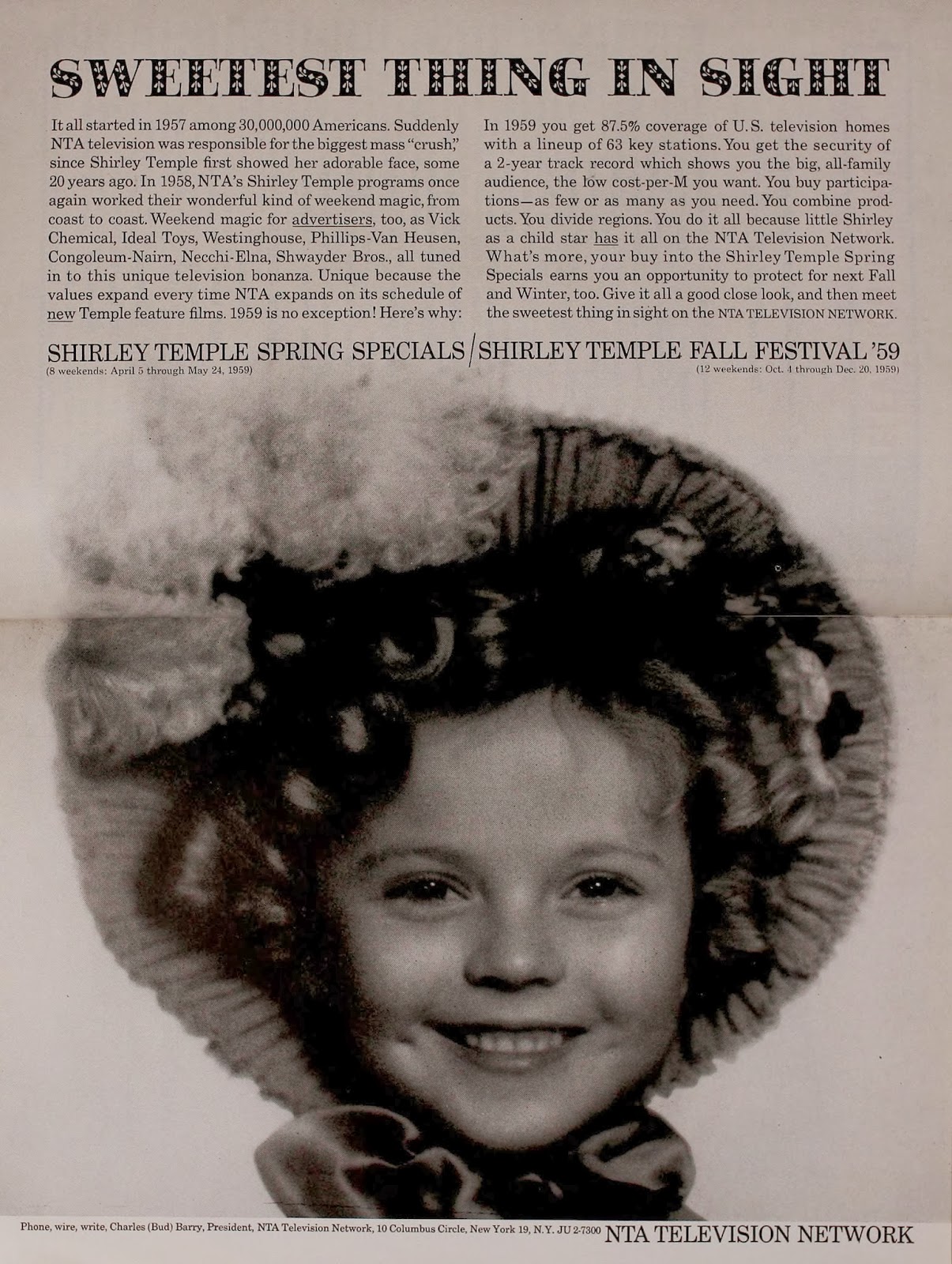
Shirley Temple, who passed away at age 85 this past Monday, was twice a showbiz phenomenon. The first reign has been pretty well covered by the obits: in the space of two years (1933-34) she shot like a rocket from "leading lady" of Educational Pictures' execrable "Baby Burlesk" one-reelers to number one box office attraction in the country, then held that position for four years straight.
 |
| Picture Play, 1934 |
Her second rise is less well-covered. In 1957, National Telefilm Associates (NTA), looking to build its own syndication network, leased a block of pre-'48 features from 20th Century-Fox, including four of Shirley's:
Captain January,
Wee Willie Winkie,
Heidi and
Rebecca of Sunnybrook Farm. These were extracted from the main package and offered as "The Shirley Temple Film Festival" to national advertisers. Ideal Toys immediately signed on for one-third of the package. Reaction was so solid, NTA immediately added
Poor Little Rich Girl and
Little Miss Broadway to the lineup. By mid-1961, all of Shirley's Fox product was on the air, and local stations would keep the "Temple Film Festival" active into the 1970s.
My own experience was on Metromedia's WNEW-5 in New York City. In my preadolescence, Shirley graced Saturday afternoons as reliably as did Leo Gorcey and Huntz Hall on Sundays for channel 5's "East Side Comedy" hour.
 |
| Ken Films' releases were worth buying for the covers alone! |
Like any red-blooded youth, I developed a crush on the dimpled darling, albeit aware that it not only transcended distance but time as well. The closest I could get to everyday company with Shirley was via Ken Films' 8mm releases of four Baby Burlesk titles. The genuine Shirley Temple was by then engaged in her second vocation with the United Nations and was about to become - most unexpectedly - an empathetic torch carrier for sufferers of breast cancer.

When her films first tallied up huge ratings and grosses in the late fifties, she signed on for a fairy tale program,
Shirley Temple's Storybook, broadcast in color on NBC. Several of the tapes survive and were released to DVD in recent years, but as forshadowed by this 1958
TV GUIDE cover, it's the original, Depression-era Shirley that still gets the glory... and likely always will.
 Shirley Temple, who passed away at age 85 this past Monday, was twice a showbiz phenomenon. The first reign has been pretty well covered by the obits: in the space of two years (1933-34) she shot like a rocket from "leading lady" of Educational Pictures' execrable "Baby Burlesk" one-reelers to number one box office attraction in the country, then held that position for four years straight.
Shirley Temple, who passed away at age 85 this past Monday, was twice a showbiz phenomenon. The first reign has been pretty well covered by the obits: in the space of two years (1933-34) she shot like a rocket from "leading lady" of Educational Pictures' execrable "Baby Burlesk" one-reelers to number one box office attraction in the country, then held that position for four years straight.

 When her films first tallied up huge ratings and grosses in the late fifties, she signed on for a fairy tale program, Shirley Temple's Storybook, broadcast in color on NBC. Several of the tapes survive and were released to DVD in recent years, but as forshadowed by this 1958 TV GUIDE cover, it's the original, Depression-era Shirley that still gets the glory... and likely always will.
When her films first tallied up huge ratings and grosses in the late fifties, she signed on for a fairy tale program, Shirley Temple's Storybook, broadcast in color on NBC. Several of the tapes survive and were released to DVD in recent years, but as forshadowed by this 1958 TV GUIDE cover, it's the original, Depression-era Shirley that still gets the glory... and likely always will.

